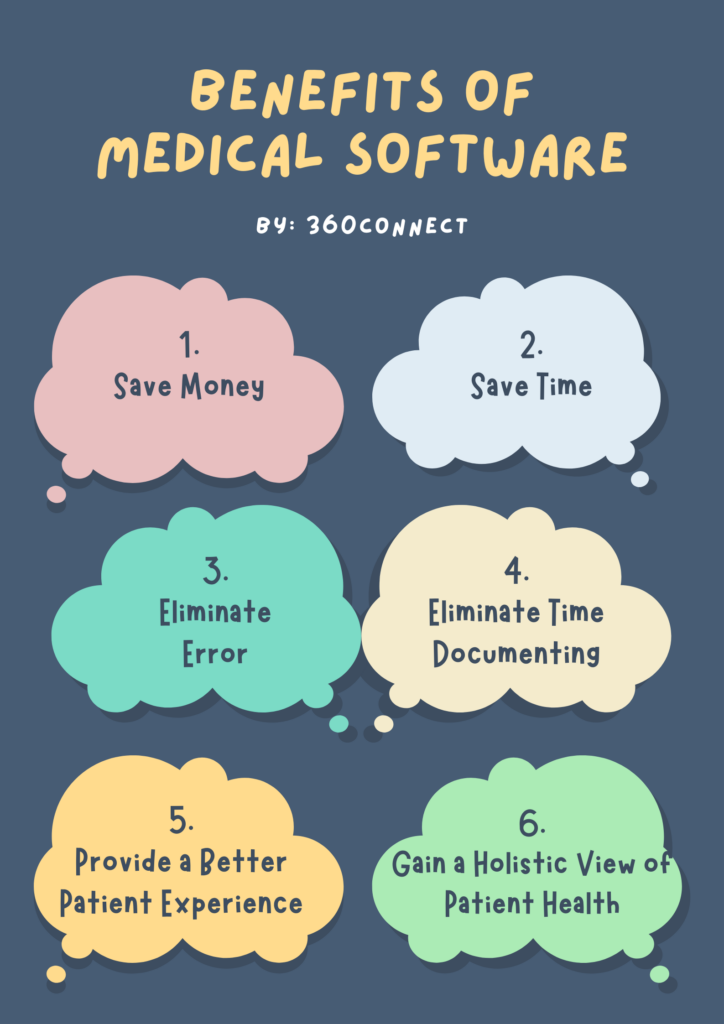Choosing medical software is becoming one of the most important parts of medical healthcare and becoming critical to providing good care. The right type of medical software can help improve your services as well as improve the overall quality of life for your staff. Still, hospitals and medical offices still have trouble finding the right medical software for them. With a plethora of options, and not nearly enough time, here is a simple breakdown of the most common types of medical software:
- EHR – Electronic Health Records / EPR – Electronic Patient Record Software / EMR – Electronic Medical Record
- Medical Database Software
- Hospital Management Software
- Medical Diagnosis Software
- Medical Imaging Software
- E-Prescribing Software
- Medical Research Software
- Telemedicine Software
- Medical Billing Software
- Medical Equipment Software

EHR – Electronic Health Records / EPR – Electronic Patient Record Software / EMR – Electronic Medical Record
EHR software stores data information on patients, often from different locations. This data can include past doctor visits, examinations, or procedures they may have completed, doctor’s notes, as well as other medication information. Having proper EHR software is critical to a well-rounded and complete view of a patient’s health. Many systems provide a view for both patients as well as the medical staff. That way all parties are informed of past medical information. Most EHR systems are developed with the goal in mind to simplify relevant patient information (although the implementation will affect the validity of this claim).
While an EHR can function as an all-encompassing system, it is important to note that you will hear phrases such as EPR and EMR as well. These are types of EHR software systems. Most systems use a combination of these systems or sell them as separate entities.
- EPR refers to the storage of a patient’s information in a secure cloud or local digital storage system.
- EMR refers to data on medications and dosages, past and planned procedures, and recovery progress throughout medical service.
Both of these types of services provide vital storage and information that can be accessed by medical staff. EHR systems are becoming an integral part of the healthcare experience and are routinely recommended as one of the most common and important pieces of software hospitals need.
Medical Database Software
Similar to EHR software, medical database software stores information on patients. This could include past medical information, treatments, diagnosis, recovery, medication, and more. However, there is a key difference between medical database software and EHRs:
Medical database software classifies cases by disease diagnosis.
Medical database software can help medical professionals treat patients better by analyzing similar cases. From there, doctors can make decisions based on other cases as well as view how the patient differs from other cases.
A medical database is a type of medical software that can give doctors a better starting point when it comes to treating certain illnesses and developing strategies. In other words, think of it as a mass filtering system. Doctors can easily find information based on specific illnesses, which can lead to better and more trusted methods of relief.
Hospital Management Software / Scheduling Software
Hospital management software is all about optimizing administrative tasks. An HMS software could tackle routine things such as scheduling appointments or organizing financial information. Hospital management software helps your administration staff save time as well as be flexible. You can optimize and review data concerning workflows, identify and store finances, and enhance patient care.
Hospital management software may also provide you with key medical capabilities such as:
- Text messaging for patients
- File or image sharing
- Routine notifications for patients
- Security enhancements
- Emergency information when necessary.
- And more!
If you choose to invest in hospital management software, you’ll want to work for a system that is intuitive and provides end-to-end encryption. It’s important that the software keeps your patient data safe and easily implemented across departments. Further reading can be found at:
Medical Scheduling Software: Features, Pricing, and Top Providers
Medical Diagnosis Software
One of the best ways to help diagnose patients is through medical diagnosis software. Most medical diagnosis software is powered by artificial intelligence and can provide responses to symptoms and patient data. Once you start inputting information, the medical diagnosis software will allow you to narrow down results for treatment. Most systems can also analyze patient data and allow doctors to collaborate within the system on patient diagnosis. It promotes cross-pollination between different departments and diagnoses.
Medical diagnosis software helps doctors predict and analyze illnesses. You can use this software to treat patients, collaborate, and classify trends or patterns.
Medical Imaging Software
CT scans, MRIs, and other procedures have become a mainstay of medical health. Medical imaging software can help doctors and medical staff plan complex procedures, give correct diagnoses, and explain information to patients in an easy-to-understand manner. Images can be displayed in 2D, 3D, and 4D, depending on the software. The system can then store this data for accurate record keeping. while this may not be necessary at all clinics, it is a vital component of major hospitals and labs. Furthermore, this can improve accurate diagnosis as well as efficiency and speed.
E-Prescribing Software
E-prescribing software is exactly what it sounds like. Health professionals use this type of medical software to forward medication to two pharmacies and prescription centers. Health staff can leave notes and messages for pharmaceutical staff as well. This informs both parties about necessary prescription requirements and keeps this information stored securely.
Medical Research Software
Due to coronavirus, a bigger spotlight has been put on medical research than ever before. It is essential that doctors and medical staff have access to new and relevant research. Providing them with this type of medical software will enable them to stay at the forefront of the medical world. It’s an investment in the knowledge of your staff, one that will pay dividends as the nature of health services continues to evolve.
Telemedicine Software
With the rise of the pandemic telemedicine services have become drastically more important. Telemedicine is the use of virtual communications (video, chat, or call) to treat patients. It has played a crucial role in stopping community spread and giving care in remote areas. However, doctors and patients are just now beginning to grasp just how wonderful telemedicine can actually be. Patients are seeing their doctors at a fraction of the cost, while still getting the services they need. These services mitigate outbreaks and ensure patients see their doctor even during a busy schedule. Although the pandemic is coming to a close (hopefully), telemedicine will be here to stay.
Medical Billing Software
Medical billing software is just like any other system that tracks billing information, except it is finely tuned for medical purposes. You can track invoices, past payments, recurring expenses, and more. This helps keep the hospital in good financial standing, it makes the job of hospital accountants much easier. If you’d like to learn more about medical billing check out our other articles:
Top 8 Medical Billing Software Choices in 2021
Best Medical Billing Software for Small Practices
Medical Equipment Software
Medical equipment software allows you to track the usage, storage, and maintenance of specific medical items. With the right software, you will be able to prevent downtime as well as missed maintenance. This software system will verify you get the most use out of your medical equipment and notify you when it’s time to upgrade.
What’s Right for You?
Are you considering different types of medical software for your needs? Have trouble identifying the best path forward? We can help. At 360Connect, we can help you find exceptional suppliers that can service your needs. Contact us today to find out how 360Connect can help you.
Want to learn more?
Electronic Health Records (EHR): Features, Benefits, and Cost
How Much Does Medical Billing Software Cost?
5 Key Differences Between Practice Management System and EMR

